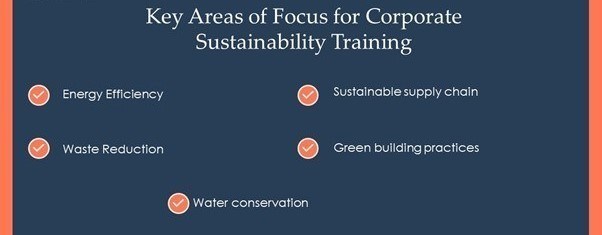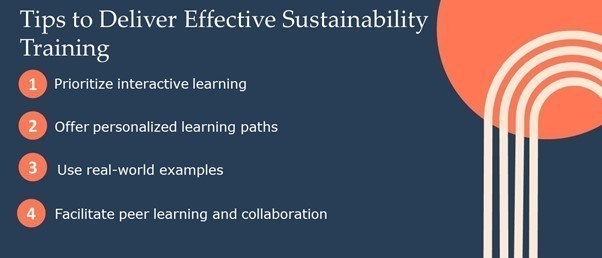Sustainability Training And eLearning
Sustainability has evolved from a buzzword to a crucial driver of success today. Businesses are increasingly recognizing that integrating sustainability into their operations is not just an ethical choice but a necessity. Beyond the motive of contributing to a healthier planet, companies understanding sustainability gain a competitive edge by attracting environmentally conscious consumers, investors, and employees. As highlighted by Forbes, a substantial 88% of consumers express loyalty towards companies actively supporting social or environmental causes.
Watch this video to learn about the potential of eLearning for sustainability training.
Sustainability Training For Corporates
Sustainability training for corporates is a crucial initiative that goes beyond conventional business practices. It involves equipping employees with the knowledge and skills necessary to contribute to environmentally and socially responsible practices within the organization. This type of training fosters a culture of sustainability, aligning the workforce with the company's commitment to positive environmental and social impact.
In the realm of corporate sustainability, the significance of environmental responsibility looms large, influencing both the business operations and the broader societal impact of businesses. As the renewable energy market is poised to expand into a $2.15 trillion industry by 2025, corporate leaders are awakening to the necessity of adopting sustainable practices.

Incorporating sustainability into corporate training involves addressing various aspects, such as resource efficiency, ethical business practices, and community engagement. By instilling a sense of responsibility and awareness, organizations can create a workforce that actively participates in sustainable practices, ultimately benefiting both the company and the wider community.
Benefits Of Sustainability Training
Fosters Environmental Responsibility
Sustainability training provides companies with the opportunity to actively contribute to the emerging renewable energy sector. By adopting practices that emphasize resource conservation, waste reduction, and recycling, companies can align with the growing global focus on renewable energy solutions. In addition, sustainability training programs often provide employees with a deeper understanding of the environmental impact of their roles.
Mitigates Risks
Sustainability training promotes a culture of responsibility and transparency. Employees who are trained in sustainable practices are more likely to recognize and report potential risks or environmental issues. This awareness and commitment to responsible business practices helps improve an organization's overall response to a variety of risks. Integrating sustainability training into corporate learning programs is all about building a risk-aware culture. This improves a company's ability to overcome challenges and adapt to changing global expectations for responsible and sustainable business practices.
Builds Global Relevance
In an interconnected world where businesses operate across diverse cultures and regulations, such training is instrumental. It empowers employees with the knowledge and skills to strive for international standards, fostering global recognition and respect. Ultimately, organizations that prioritize sustainability training gain a competitive advantage in global markets, attracting environmentally conscious consumers and partners worldwide. This commitment positions them as responsible global citizens contributing positively to the challenges faced by the world.
Cuts Down Costs
Through their long-term reduction of waste, less energy usage, and better resource utilization, sustainable practices can help organizations save money. Further supporting sustainability, a McKinsey study shares a significant correlation between a company's resource efficiency and its financial performance strength. The study reveals that through the reduction of resource costs, a company stands to enhance its operating profits by up to 60%.
Enhances Employee Engagement
As organizations prioritize sustainability initiatives through training programs, employees find themselves connected to a higher purpose beyond their day-to-day tasks. This shared commitment to environmental responsibility and ethical business practices becomes a unifying force, elevating employee morale and job satisfaction. When employees feel that their work is contributing to a worthwhile cause that has a positive impact on the environment, they are more excited about what they do.

Steps To Chart A Course For Successful Sustainability Training Implementation
1. Assess Organizational Needs
Start by conducting a comprehensive assessment of your company's specific sustainability needs. Identify areas where training can have the greatest impact, taking into account environmental, social, and economic factors. This assessment can serve as the basis for designing targeted and relevant training programs.
2. Define Clear Learning Objectives
Clearly articulate the learning objectives of your sustainability training program. Establish what you aim to achieve through these programs, whether it's reducing carbon footprint, promoting ethical business practices, or fostering a culture of environmental responsibility. Well-defined objectives provide direction and help measure the success of your efforts.
3. Customize Training Content
Tailor training content to address the unique challenges and goals identified in your assessment. Design personalized training materials that resonate with your workforce. Utilize real-life examples, case studies, and practical scenarios to enhance understanding and application of sustainable practices in the workplace.
4. Incorporate Diverse Learning Methods
Recognize that individuals have different learning preferences. Implement a variety of training methods, such as workshops, eLearning modules, webinars, and hands-on experiences. Additionally, you must provide your content using a variety of mediums, formats, and media. This approach ensures that the training appeals to a broad audience and accommodates various learning styles.
5. Engage Leadership And Stakeholders
Since leadership support is crucial in driving a culture of responsibility from the top down, secure commitment and involvement from top leadership demonstrates the importance of sustainability within the organization. Engage stakeholders, including employees, suppliers, and customers, to foster a collective commitment to sustainability goals.
6. Measure And Evaluate
Establish Key Performance Indicators (KPIs) to measure the effectiveness of your sustainability training programs. Regularly evaluate the impact on employee behavior, operational practices, and overall organizational sustainability. Use feedback mechanisms and assessments to continually refine and improve your training initiatives.
7. Promote Continuous Learning
Sustainability is a dynamic field with evolving practices and regulations. Encourage a culture of continuous learning by providing ongoing training opportunities. Keep employees informed about the latest developments in sustainability, ensuring they stay ahead of industry trends and contribute to the organization's long-term success.
Building A Green Path Ahead
Corporate sustainability isn't just a noble endeavor anymore, it's more of a strategy for businesses aiming to thrive in the future. By prioritizing social and environmental impacts, organizations not only contribute to a healthier planet but also fortify their own longevity. Mitigating risks and building a robust brand reputation are intrinsic benefits of sustainability efforts, creating a positive feedback loop that attracts customers, investors, and top-tier talent.
In an era shaped by global challenges, businesses committed to sustainability are not just meeting current expectations but are future-proofing themselves. The forward-thinking companies that actively engage in sustainable practices are pioneers in the evolving economy, setting the stage for a resilient and prosperous future.










